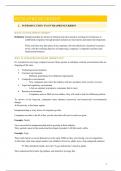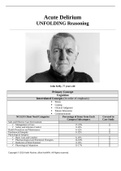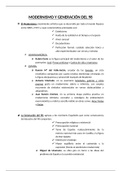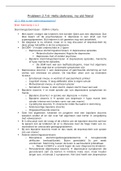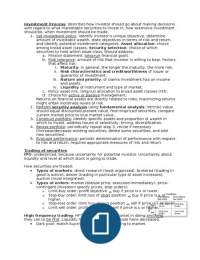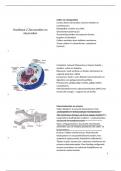Summary Acadamic Writing
Introduction to science
What is science?
Latin verb ‘scire’: knowing
Systematic knowledge acquisition: reliable (accuracy and repeatable) and valid (do you
measure what you want to measure?)
Fundamental scientific research (pure basic scientific science)
o Purpose: understanding, formulating general theories, abstract
o What is ..?
o Reason: curiosity, exploratory in nature, provides a foundation for further,
sometimes applies research
o Knowledge-driven
o Performed by: scientists
Applied scientific research
o Objective: to contribute to solving practical problems, less abstract
o How can..?
o Reason: practical, contributing to improving the world
o Knowledge-driven !!
o Performed by: scientists
Practical research
o Purpose: advising and/or intervening, concrete, mostly commercial
o How to intervene..?
o Reason: practical and aimed at (usually) only one stakeholder
o Problem-based, use of knowledge
o Carried out by: consultants, managers, engineers, scientists in role of consultants
Four ways to acquire knowledge
1. Intuition possible starting point of scientific research by means of formulating hypotheses:
‘’I believe that…”
2. Authority acquire knowledge through an authoritative person. Also starting point of
scientific research.
3. Rationalism reason is the only or main source of knowledge. Reasoning, logic and
mathematics instead of observations. Assumption: the ‘’truth’’ can be ascertained through
reason
4. Empiricism knowledge is the result of experience and observations through the senses.
Assumption: the origin of all knowledge comes from our senses. By means of experiments
Scientific methods
1. Induction and deduction (late 17th century-1850): from specific to general and from general
to specific
o Induction: from specific to general from a specific observation to a broader
general claim
o Deduction: From general claim to a specific judgment
Syllogism (deductive argument derived by Aristotle):
P1. All A is B
, P2. C is an A
Claim. C is B
A,B,C are terms of the argument, P1 and P2 are the premises of the
argument (assumptions that something is true)
2. Testing of hypotheses (1850 – 1960): process of testing an assumed relationship or
hypothesis by means of (new) observations
o 1850: induction was considered inappropriate to develop good scientific theories
o From now on, add testing of hypotheses as step after induction
o William Whewell: Science should focus on the confirmation of predictions from
theory and experience
o Still influential as scientific method
o Logical positivism a claim or theory is only meaningful if it is controllable
(verifiable) by mean or observation. This directly links with empiricism
o Principle of verification = the truth of a theory must be demonstrated/proven by
observation
o Karl Popper method or approach is falsification method criticism on logical
positivism verification is impossible, because you can’t witness all situations
o A theory is falsifiable and not verifiable a theory is true as long as it has not been
shown to be false black swan
o According to Popper, the reasoning of logical positivism is based on fallacy
(drogreden): affirming the consequent (confirming the consequent) ‘’If p, then q’’
is true, q is true, so p is true (then it must be a result of p?)
3. Naturalism (from 1960): ‘approach’ and period within science that assumes that theories
must be tested empirically, including the empirical cycle.
o Is in line with the previous method
o Pragmatic: which theories work? ‘’it should help you’’
o Requirement: access/evaluate theories on the basis of ‘’empirical adequacy’’: are
these empirically sufficient? Which theories appear to explain and predict in
practice? Then: further develop theory or reject (evolution or revolution)
o In other words: do the empirical data support the theory? Are the predictions
accurate? Are the ‘’right” causal relationships found? Are these exactly?
o Thomas Kuhn: normal science versus revolutionary science
o Normal science: developing and further developing theory based on a certain view of
reality
o Revolutionary science: new view of reality leads to new insights and thus to new
theories. New insights no longer fit In with the current theory or are even
contradictory.
o Kuhn calls looking at reality paradigm: ‘’a framework of thought or beliefs by which
reality is interpreted. Revolution leads to paradigm shift’’. Examples: ‘’earth is flat’’
and ‘’earth is center of the universe’’
o Feyerabend’s Anarchistic Theory of Science: that scientific methods are criticized and
are failing is not surprising!
o Enfant terrible’ of the philosophy of science, universal scientific method does not
exist
o The only scientific method that will not hinder the progress of science is the
anarchistic method: anything does: do not care about existing scientific methods and
requirements. Follow your own way.
Introduction to science
What is science?
Latin verb ‘scire’: knowing
Systematic knowledge acquisition: reliable (accuracy and repeatable) and valid (do you
measure what you want to measure?)
Fundamental scientific research (pure basic scientific science)
o Purpose: understanding, formulating general theories, abstract
o What is ..?
o Reason: curiosity, exploratory in nature, provides a foundation for further,
sometimes applies research
o Knowledge-driven
o Performed by: scientists
Applied scientific research
o Objective: to contribute to solving practical problems, less abstract
o How can..?
o Reason: practical, contributing to improving the world
o Knowledge-driven !!
o Performed by: scientists
Practical research
o Purpose: advising and/or intervening, concrete, mostly commercial
o How to intervene..?
o Reason: practical and aimed at (usually) only one stakeholder
o Problem-based, use of knowledge
o Carried out by: consultants, managers, engineers, scientists in role of consultants
Four ways to acquire knowledge
1. Intuition possible starting point of scientific research by means of formulating hypotheses:
‘’I believe that…”
2. Authority acquire knowledge through an authoritative person. Also starting point of
scientific research.
3. Rationalism reason is the only or main source of knowledge. Reasoning, logic and
mathematics instead of observations. Assumption: the ‘’truth’’ can be ascertained through
reason
4. Empiricism knowledge is the result of experience and observations through the senses.
Assumption: the origin of all knowledge comes from our senses. By means of experiments
Scientific methods
1. Induction and deduction (late 17th century-1850): from specific to general and from general
to specific
o Induction: from specific to general from a specific observation to a broader
general claim
o Deduction: From general claim to a specific judgment
Syllogism (deductive argument derived by Aristotle):
P1. All A is B
, P2. C is an A
Claim. C is B
A,B,C are terms of the argument, P1 and P2 are the premises of the
argument (assumptions that something is true)
2. Testing of hypotheses (1850 – 1960): process of testing an assumed relationship or
hypothesis by means of (new) observations
o 1850: induction was considered inappropriate to develop good scientific theories
o From now on, add testing of hypotheses as step after induction
o William Whewell: Science should focus on the confirmation of predictions from
theory and experience
o Still influential as scientific method
o Logical positivism a claim or theory is only meaningful if it is controllable
(verifiable) by mean or observation. This directly links with empiricism
o Principle of verification = the truth of a theory must be demonstrated/proven by
observation
o Karl Popper method or approach is falsification method criticism on logical
positivism verification is impossible, because you can’t witness all situations
o A theory is falsifiable and not verifiable a theory is true as long as it has not been
shown to be false black swan
o According to Popper, the reasoning of logical positivism is based on fallacy
(drogreden): affirming the consequent (confirming the consequent) ‘’If p, then q’’
is true, q is true, so p is true (then it must be a result of p?)
3. Naturalism (from 1960): ‘approach’ and period within science that assumes that theories
must be tested empirically, including the empirical cycle.
o Is in line with the previous method
o Pragmatic: which theories work? ‘’it should help you’’
o Requirement: access/evaluate theories on the basis of ‘’empirical adequacy’’: are
these empirically sufficient? Which theories appear to explain and predict in
practice? Then: further develop theory or reject (evolution or revolution)
o In other words: do the empirical data support the theory? Are the predictions
accurate? Are the ‘’right” causal relationships found? Are these exactly?
o Thomas Kuhn: normal science versus revolutionary science
o Normal science: developing and further developing theory based on a certain view of
reality
o Revolutionary science: new view of reality leads to new insights and thus to new
theories. New insights no longer fit In with the current theory or are even
contradictory.
o Kuhn calls looking at reality paradigm: ‘’a framework of thought or beliefs by which
reality is interpreted. Revolution leads to paradigm shift’’. Examples: ‘’earth is flat’’
and ‘’earth is center of the universe’’
o Feyerabend’s Anarchistic Theory of Science: that scientific methods are criticized and
are failing is not surprising!
o Enfant terrible’ of the philosophy of science, universal scientific method does not
exist
o The only scientific method that will not hinder the progress of science is the
anarchistic method: anything does: do not care about existing scientific methods and
requirements. Follow your own way.


